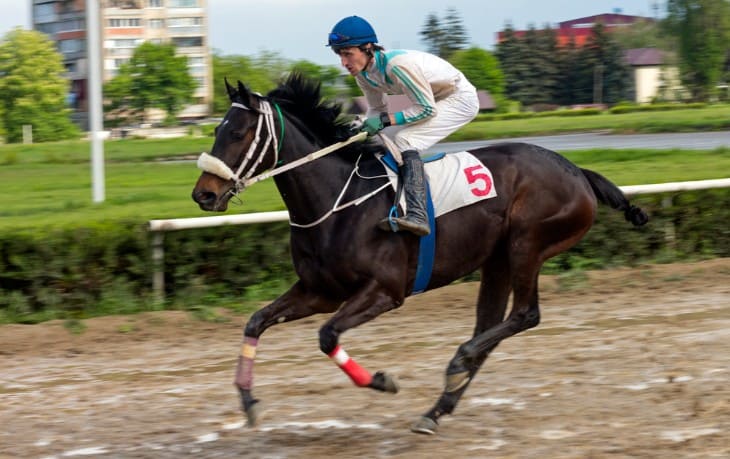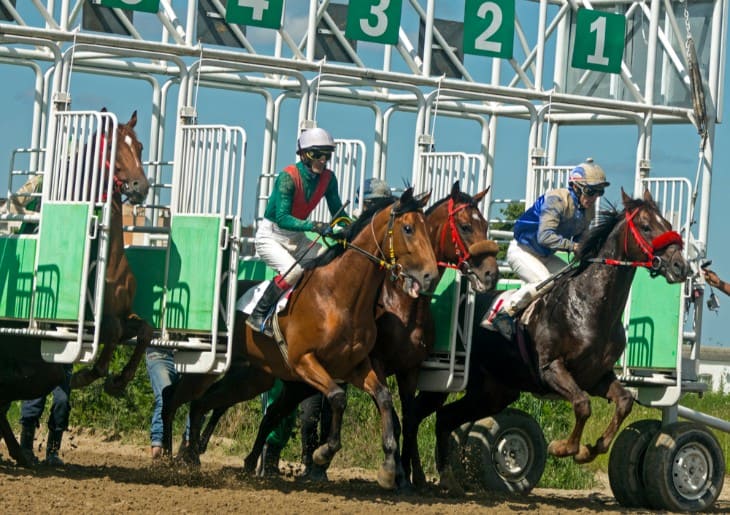Horse racing has long been a sport that captures the hearts and wallets of enthusiasts, combining the elegance of thoroughbred animals with the excitement of wagering. Whether you're a seasoned punter or a novice intrigued by the trackside buzz, understanding the intricate web of betting terminology is crucial to navigating this captivating world. In this article, we'll unravel the complexities of horse racing betting terminology, allowing you to confidently place your bets and enhance your overall racing experience.
Betting Terminology in Horse Racing
As you step into the world of horse racing betting, you'll come across a web of terms that might seem perplexing at first glance. But worry not – we stand ready to lead you through this, by shedding light on the fundamental terms that anchor horse racing wagering.
At its core, horse racing betting involves predicting the outcome of races and placing wagers based on your predictions. To make informed decisions, you need to understand odds, race types, betting markets, handicaps, and more. While it might sound like a lot to take in, breaking down these elements will pave the way for a more rewarding betting experience.
Navigating the Odds: Decimal, Fractional, and Moneyline Formats
Odds are the heartbeat of any betting venture, acting as the bridge between your predictions and potential returns. In horse racing, odds reflect the probability of a particular horse winning a race. Mastering the different odds formats – decimal, fractional, and moneyline – is essential to calculating potential profits and making informed betting choices.
Decimal Odds
Widely used in Europe, decimal odds express the potential return on a bet, including the original stake. For instance, if a horse has odds of 4.50, a £10 bet would yield a total return of £45 (£35 in profit plus the original £10 stake).
Fractional Odds
A staple of British and Irish betting, fractional odds represent the profit relative to the stake. If a horse has odds of 5/1, a £10 bet would result in a £50 profit, in addition to the original £10 stake.
Moneyline Odds
Mainly employed in American betting, moneyline odds come in positive or negative values. Positive moneyline odds, such as +600, indicate potential profit on a £100 wager, while negative odds, like -200, signify the amount you need to bet to win £100.
Having a firm grasp of these odds formats empowers you to quickly calculate potential returns and compare odds across bookmakers. As you delve deeper into horse racing betting, this knowledge becomes invaluable for making strategic wagers that align with your predictions.

Unraveling Race Types: Flat Racing, National Hunt, and All-Weather Tracks
In the world of horse racing, the variety of race types adds depth and diversity to the sport. Three primary categories dominate the scene: flat racing, National Hunt, and all-weather tracks. Each category presents its own unique challenges, conditions, and strategies that punters must navigate.
Flat Racing
The epitome of speed and elegance, flat racing is a showcase of athleticism. Horses gallop over level tracks, competing in sprints and longer distances. The absence of obstacles means that speed and stamina are paramount, making flat racing a spectacle of raw horsepower and strategy.
National Hunt
Enter the field of jumps and hurdles in National Hunt racing. This category encompasses races like hurdles and steeplechases, where horses not only race against each other but also navigate challenging obstacles. Endurance and jumping ability are crucial, as horses must clear hurdles and leap over fences while maintaining their momentum.
All-Weather Tracks
In a nod to the unpredictable British climate, all-weather tracks provide a reliable racing surface in rain or shine. These tracks are made of synthetic materials, offering consistent conditions regardless of weather conditions. Punters appreciate the predictability of all-weather races and can factor in track conditions more effectively.
Understanding the distinctions between these race types enables you to tailor your bets to suit the specific demands of each category. Whether you're captivated by the speed of flat racing, the excitement of jumps in National Hunt, or the reliability of all-weather tracks, your betting strategy can be finely tuned to match the dynamics of the race.
Deciphering Betting Markets: Win, Place, Show, and Exotic Bets
As you delve deeper into the world of horse racing betting, you'll encounter a diverse array of betting markets that offer varying levels of risk and reward. From straightforward win bets to more complex exotic bets, the betting markets provide a playground for punters seeking different levels of challenge.
Win Bets
The quintessential bet, the win bet involves selecting a horse you believe will cross the finish line first. If your chosen horse secures victory, you cash in on your wager. A win bet offers simplicity and a direct connection to the excitement of the race.
Place Bets
Expanding your horizons, place bets offer a safety net by allowing you to bet on a horse to finish in the top two or sometimes three positions, depending on the size of the field. While the odds may be lower than a win bet, the likelihood of a return increases, providing a more conservative option.
Show Bets
For those seeking even more conservative options, show bets come into play. Here, you're betting on a horse to finish in the top three positions. While the potential payouts may not be as substantial, the chances of winning are greater, making it an appealing choice for risk-averse punters.
Exotic Bets
As you grow more confident, exotic bets introduce an element of complexity and intrigue. These bets involve multiple horses and races, such as exactas (predicting the top two finishers in order) and trifectas (predicting the top three finishers in order). The allure of exotic bets lies in their potentially high returns, but they require a deep understanding of form, strategy, and a touch of luck.
Mastering Handicaps and Weight: Understanding Implications for Betting
In the realm of horse racing, the concept of handicapping adds an intriguing layer of complexity to the betting landscape. Handicaps are designed to level the playing field by assigning weights to horses based on their past performances. The aim is to create a more balanced competition, where talented horses carry additional weight, theoretically giving lesser-performing horses a fair chance.
When delving into handicapping, it's essential to comprehend the implications of weight on a horse's performance. A heavier weight may affect a horse's speed and stamina, potentially impacting its chances of victory. However, handicaps also present a tantalizing opportunity for astute punters to uncover value in overlooked contenders.
By studying the weight assigned to each horse and how it compares to its past performances, you can identify horses that may be well-suited to handle the additional burden. A comprehensive analysis of past races, track conditions, jockey expertise, and current form can help you decipher which horses are poised to excel under the handicapping system.
Studying Form and Performance: Evaluating Horses, Jockeys, and Trainers
Unlocking the secrets of horse racing betting requires more than a rudimentary glance at the odds and racecard. A deep dive into the form and performance of horses, jockeys, and trainers is a fundamental aspect of making informed betting decisions.
Horse Form
Lookoing at a horse's recent performance history unveils valuable insights. Examining factors such as recent wins, placements, and consistency can help you understand a horse's current competitive prowess. Pay attention to the types of races a horse excels in, its preferred distance, and its performance on specific track conditions.
Jockey Influence
Jockeys play a pivotal role in a horse's success. Their riding style, experience, and track knowledge contribute significantly to a horse's performance. A skilled jockey can often coax the best out of a horse, so researching jockeys' records and previous successes on specific horses can provide an edge.
Trainer Expertise
Behind every successful horse, there's a dedicated trainer. Assessing a trainer's track record, training methods, and recent achievements can give you valuable insights into the potential of their horses. Experienced trainers with a history of nurturing winning horses are indicators of a well-prepared contender.
By analysing the form and performance of horses, jockeys, and trainers, you'll be better equipped to identify hidden gems and potential contenders that may have been overlooked by casual bettors. With this knowledge, you can make more informed bets that are grounded in a comprehensive understanding of the intricate factors that contribute to success in the world of horse racing.
Delving into Racecards: Interpretation and Key Information
As you immerse yourself in the exhilarating world of horse racing betting, the racecard becomes your trusty companion, offering a treasure trove of information. A racecard is your guide to the day's races, providing essential details about each race and its participants.
At a glance, a racecard reveals the names of horses, their jockeys, trainers, and crucially, their recent form. Understanding how to decipher this information can empower you to make more informed betting decisions. By evaluating a horse's recent performances, the conditions it's accustomed to, and the jockey-trainer combination, you can build a clearer picture of each contender's potential.
Pay attention to additional details such as the horse's age, weight, and even the stall it starts from. These seemingly small factors can have a significant impact on a horse's performance. Moreover, racecards often highlight horses' past performances on specific track conditions, providing valuable insights into their adaptability to different surfaces.
Racecards also present odds for each horse, allowing you to compare the betting market's perception of a horse's chances with your own analysis. This juxtaposition of insights is where seasoned punters find value – identifying horses with odds that seem disproportionately high compared to their potential for success.
Strategies for Smart Betting: Bankroll Management and Staking Plans
As you journey through the world of horse racing betting, developing sound strategies for managing your bankroll is paramount. Regardless of your level of experience, maintaining disciplined bankroll management is the key to ensuring a sustainable and enjoyable betting experience.
Establishing a bankroll – the amount of money you're willing to allocate for betting – is the foundational step. It's crucial to set aside funds that you can comfortably afford to lose without impacting your financial stability. Treat your betting bankroll as a separate entity, distinct from your everyday finances.
Next, adopt staking plans that align with your risk tolerance and goals. One common approach is the flat betting strategy, where you wager a consistent amount on each bet. This method ensures that losses are controlled and prevents chasing losses with higher bets.
Alternatively, progressive staking plans like the Kelly Criterion adjust the size of your bets based on your perceived edge and the odds available. While potentially more rewarding, these strategies require a deeper understanding of odds and probabilities.
Remember, the thrill of horse racing betting is accompanied by both wins and losses. A well-structured bankroll management plan safeguards you against the emotional rollercoaster of chasing losses or wagering too much in the heat of the moment. By betting responsibly and adhering to thoughtful staking plans, you're setting yourself up for a more enjoyable and sustainable betting journey.

Insider Insights: Grasping Insider Terminology and Track Jargon
You'll encounter a rich tapestry of insider terminology and track jargon that adds depth to your understanding and conversations. Familiarising yourself with these terms not only enhances your engagement but also allows you to navigate discussions with fellow enthusiasts and experts.
Going Conditions
The term "going" refers to the condition of the racecourse surface. It ranges from "firm" (hard ground) to "heavy" (very soft and wet). Horses have preferences for specific going conditions, so understanding this can impact your betting decisions, especially when the weather changes.
Furlong
A furlong measures approximately one-eighth of a mile and is a standard unit for indicating distances in horse racing. Races are often described in terms of furlongs, helping you gauge the length of the track and the distance horses will cover.
Nap
When a seasoned punter or tipster is especially confident in a particular horse's chances, they might refer to it as their "nap" of the day. It signifies their top selection and is worth considering as part of your analysis.
Draw Bias
In races with multiple stalls, the positioning of a horse's starting stall can affect its chances of success. This is known as "draw bias." Some tracks have a bias towards certain stalls, and understanding this can provide valuable insights into a horse's prospects.
Off the Bridle
When a horse appears to be struggling or lacks energy during a race, it's said to be "off the bridle." This term indicates that the jockey is urging the horse to perform more actively.
The Thrill of the Track: Embracing Betting Culture and Enjoying the Experience
Beyond the numbers, odds, and strategies lies the heart of horse racing – the atmosphere and excitement of the track. Embracing the betting culture and fully immersing yourself in the experience adds a layer of enjoyment that transcends the wagers themselves.
From the electrifying sounds of the crowd to the amazing horses - Immerse yourself in the companionship of fellow punters, share insights, and engage in friendly banter about potential winners.
Venture into the paddock area before races to observe the horses up close, gauge their demeanor, and assess their physical condition. Pay attention to pre-race warm-ups and observe the jockeys as they prepare for the ride. These observations can provide valuable cues that complement your research.
And lastly, remember – Win or lose, each race contributes to the tapestry of your experience, creating memories and stories to share.
Conclusion
As you continue to navigate world of horse racing betting, armed with better understanding of terminology, strategies, and track culture, you're going to improve your blends of analytical prowess with the sheer joy of the sport. Enjoy the atmosphere, engage with the community, and relish the great thrill that makes horse racing an enduring passion for countless enthusiasts.








